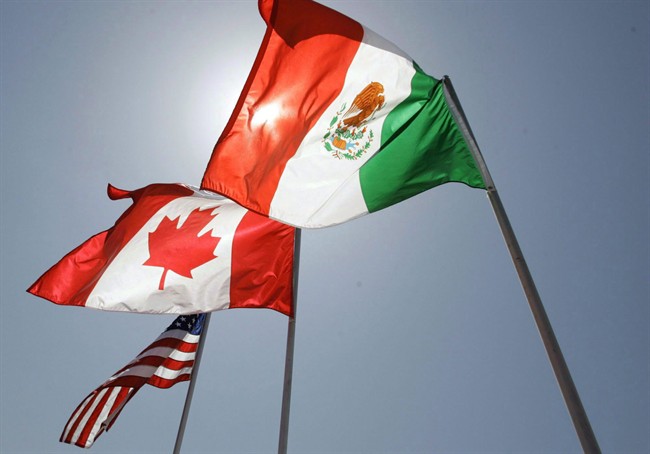MEXICO CITY – Canada and Mexico are prepared to engage the United States on one of its most contentious demands for NAFTA, in an early indication that proposals currently deemed non-starters could, in theory, be redesigned into something all three countries can live with.

It involves a U.S. idea deemed so hideous by the other parties that they refused to even look at it in the previous negotiating round. But with a significant facelift, the other countries say, the U.S. proposal could be turned into something a little more palatable, or at least worthy of discussion.
That controversial U.S. idea: a five-year sunset clause.
Also referred to as a termination clause, the proposal would end NAFTA after five years unless all three countries agree to extend it. Proposed by the Trump administration at the last negotiating round, the demand was derided by the other countries, business groups, and American lawmakers as a recipe for permanent uncertainty, contrary to the spirit of a trade agreement that is supposed to provide investor confidence.
But as the latest round of talks kicks off in Mexico City, the other countries are revealing a willingness to discuss modifying the idea. They say the termination clause could be turned into a review clause, meaning the agreement would still undergo assessments at regular intervals – without creating a climate of constant uncertainty, in which the deal could be cancelled by default.
The Mexican government has publicly and explicitly acknowledged its willingness to discuss this revised version. Now Canadian officials are saying similar things privately.
“We are going with a counter-proposal: Let’s put more force into evaluations, but let’s not establish an automatic phase-out mechanism,” Mexico’s economy minister, Ildefonso Guajardo, said this week. “Let’s establish a commitment that every five years we will evaluate what is happening, an analysis, what effects the agreement is having. And based on those results, each country can decide what to do in the future.”
That’s compatible with the Canadian position.

Get breaking National news
Prime Minister Justin Trudeau and Foreign Affairs Minister Chrystia Freeland have frequently spoken about the value of reviewing trade agreements, but have not publicly discussed the idea of embedding such a practice in a formal clause of NAFTA.
Yet one Canadian official speaking on the condition that he not be identified opened the door on Thursday to discussing the idea.
- Daylight saving time 2026: Here’s when you should set your clocks forward
- Liberals survive confidence vote as House passes budget implementation bill
- Conservative MP searches for ‘antifa’ in federal government, Canadian Armed Forces
- Canadians stranded in Puerto Vallarta after violence disrupts flights home to Edmonton
He said the notion of periodic NAFTA performance reviews is not new in trade agreements, nor is it something Canada would be unhappy to discuss should other countries wish to.
But he said the original proposal of a so-called sunset clause remains out of bounds. He said it would make for permanent uncertainty, and is unnecessary as NAFTA already has a six-month termination clause that can be invoked at any time by an unhappy signatory.
The apparent willingness to engage comes after an acrimonious round in Washington last month, where countries swatted aside each other’s major demands. At the end of the round, all three lead NAFTA ministers publicly scolded each other’s attitudes from the news conference stage.
Those politicians, Freeland, Robert Lighthizer, and Guajardo, have announced they will not attend the current round. There are also reports they might miss the next round too, as the politicians retreat from the foreground to give negotiators space to work without all the discord in public view.
This hint of willingness to compromise on a review-type clause raises the possibility that there might be some softer stances as the talks approach their hoped-for finish date of next March.
That being said, Canada, Mexico and the U.S. business community remain unnerved by some American proposals and wonder what the Trump administration actually wants. Speculation is rife in all three capitals about whether the White House wants a deal, or whether it is attempting to sabotage the talks and set the stage for the announcement of a U.S. withdrawal from NAFTA.
More than six-dozen U.S. lawmakers wrote to Trump’s trade czar this week expressing concern about the handling of the NAFTA file.
A trade consultant attending this week’s talks says this idea of a regular assessment could be a worthwhile discussion point, as long as it doesn’t come with a termination-by-default portion.
He said regular reviews would not be so revolutionary. He pointed out that the current agreement’s Chapter 20 establishes a NAFTA Commission and gives it the power to consider new matters that might affect the operation of the agreement.
“It is in fact rather normal to have periodic reviews to determine if the deal is working and can work better. It is not normally tied to killing the deal,” said Peter Clark, an Ottawa consultant.
Laura Dawson of Washington’s Wilson Center agreed that some watered-down version of the initial U.S. demand might work.
She said it might resemble the World Trade Organization’s policy-review mechanism, which requires all members to conduct a self-assessment and assessment by a panel of others every two, four or six years, although the WTO version doesn’t require countries to act in response to findings.
“The review mechanism is probably reasonable,” Dawson said.














Comments
Want to discuss? Please read our Commenting Policy first.